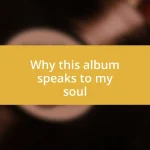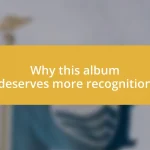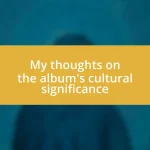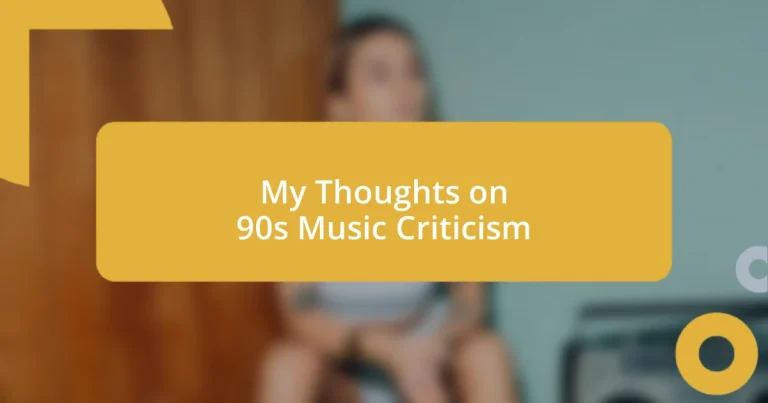Key takeaways:
- The 90s music scene was characterized by genre blending and raw emotional expression, with artists like Nirvana and Tupac redefining cultural and social narratives.
- Influential critics, such as Robert Christgau and Ann Powers, shaped public perception of music through insightful analyses, encouraging listeners to engage more deeply with the art form.
- Key themes in 90s music criticism, including authenticity and the intersection of social issues, highlighted music as a powerful medium for activism and individual connection.
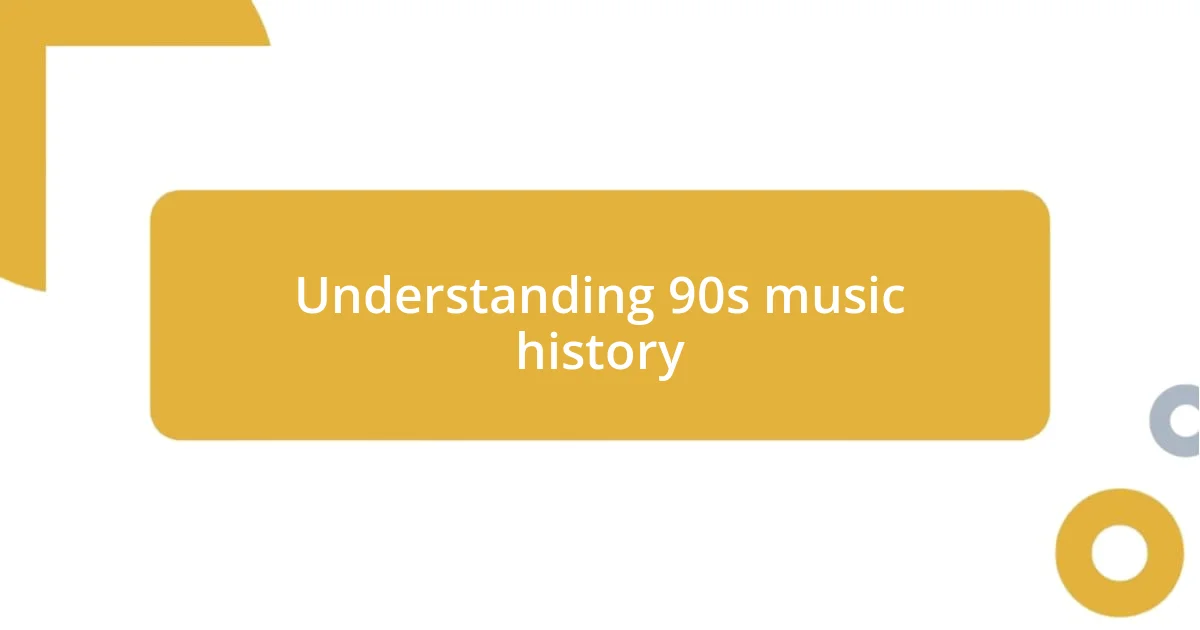
Understanding 90s music history
The 90s were pivotal for music, blending genres like never before. I remember discovering Nirvana’s “Smells Like Teen Spirit” and feeling an explosion of emotions—anger, confusion, and relief all wrapped into one. It made me wonder: how could a song resonate so deeply with my generation?
As hip-hop rose to prominence, artists like Tupac and Biggie brought storytelling to the forefront. Listening to their lyrics felt like entering a world full of raw experiences, sparking conversations about social issues that many of us were just beginning to understand. Have you ever felt that urge to explore a deeper meaning in a song? Those guys made me look beyond the beats.
Grunge, pop, and alternative rock weren’t just music styles; they were cultural movements. I still get chills thinking about how Alanis Morissette’s “Jagged Little Pill” perfectly encapsulated the feeling of youth disillusionment. It’s intriguing how music often reflects our collective mood—don’t you think? The 90s taught us that each note could tell a story, urging us to reflect on our own lives.
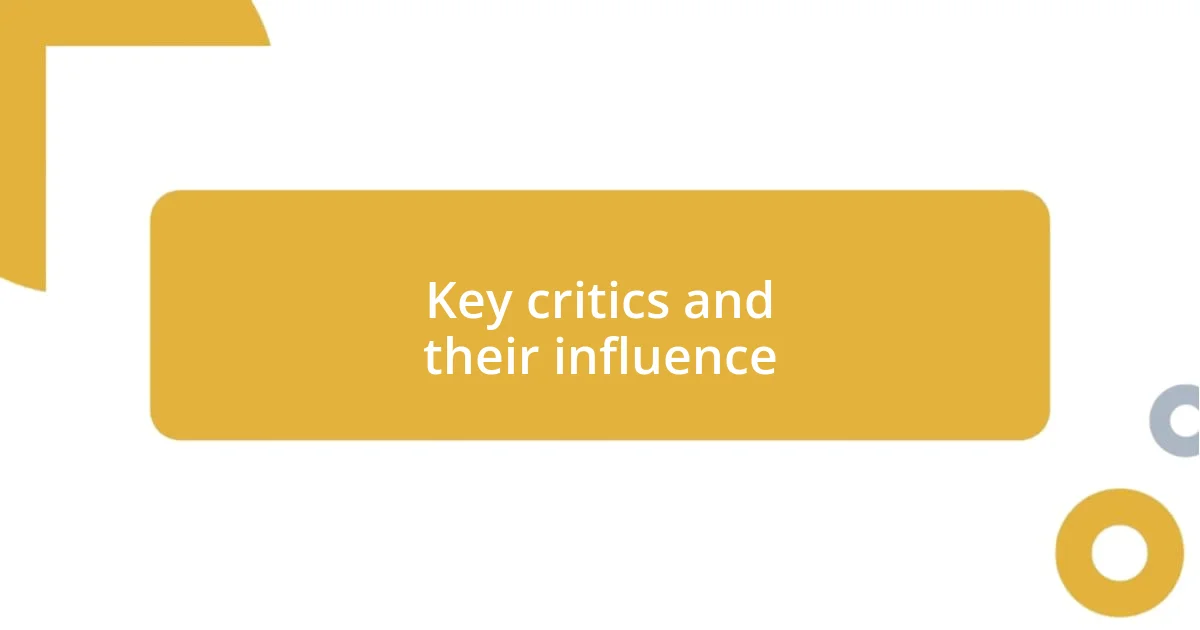
Key critics and their influence
The influence of key critics in the 90s shaped not just the way we understood music but also how artists were received by the public. Someone like Robert Christgau, often dubbed the “Dean of American Rock Criticism,” had a sharp way of dissecting albums that made readers rethink their musical choices. His succinct reviews and memorable grading system—using a simple letter scale—encouraged listeners to give thoughtful consideration to what they consumed. I remember eagerly awaiting his critiques, feeling as though he was opening up a dialogue between me and the music I loved.
- Ann Powers: She brought a feminist perspective that resonated with many, encouraging a deeper analysis of women in the music scene.
- Greil Marcus: Known for his cultural commentary, he examined the socio-political context of music, something that truly expanded my understanding of songs beyond mere enjoyment.
- David Fricke: As a senior editor at Rolling Stone, his reviews fostered a generation’s interest in roots rock and alternative bands, bridging past influences with contemporary sounds.
- Jon Pareles: His critiques in The New York Times often challenged the status quo, making readers think twice about mainstream trends.
In a way, these critics were like guides through a dense forest of sound and style. Their opinions and insights influenced how I approached my music collection. I often found myself drawn to albums that were recommended or scrutinized in publications, creating a richer and more informed listening experience. Wouldn’t you agree that critics helped us see music in a new light?
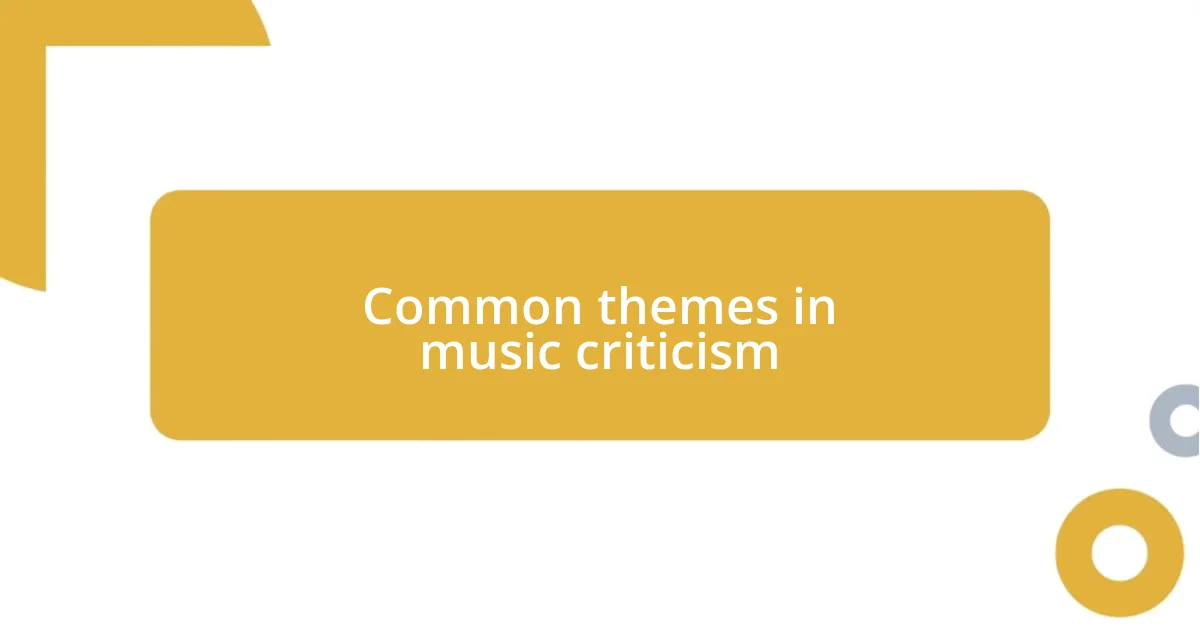
Common themes in music criticism
The world of music criticism in the 90s was dominated by several recurring themes that shaped how artists and their work were perceived. One prominent theme was the blending and crossing of genres. Critics frequently highlighted how rock, hip-hop, and pop merged, reflecting the chaotic yet vibrant spirit of the decade. I remember reading a review that underscored how such genre fusions were a testament to creativity, challenging traditional boundaries. It sparked a realization in me; those amalgamations were not just musical decisions but cultural statements too.
Another significant theme was the examination of authenticity in music. The question of whether an artist was “real” or not often came up in criticism, particularly regarding bands like Nirvana and their supposed “anti-commercial” stance. Critics scrutinized the sincerity behind the lyrics, and I found myself questioning the authenticity of music I loved. Was my enjoyment tied to its presumed authenticity? This introspection added a layer of depth to my listening experience and heightened my appreciation for artists who were often vulnerable in their work.
Finally, the 90s music criticism often focused on social and political contexts. Critics delved into how artists like Rage Against the Machine used their platform to address issues of injustice. I recall an article discussing how the raw power of their music served as a rallying cry for my generation, making us aware of societal troubles we might have otherwise overlooked. This revealed to me how music could be more than fleeting entertainment—it was also a powerful tool for activism and change.
| Theme | Description |
|---|---|
| Genre Blending | Criticism highlighted how various genres intertwined, reflecting cultural shifts. |
| Authenticity | Discussions centered on the genuineness of artists and their work, prompting deeper connection. |
| Social and Political Context | Critics explored how artists addressed societal issues, emphasizing music as a form of activism. |
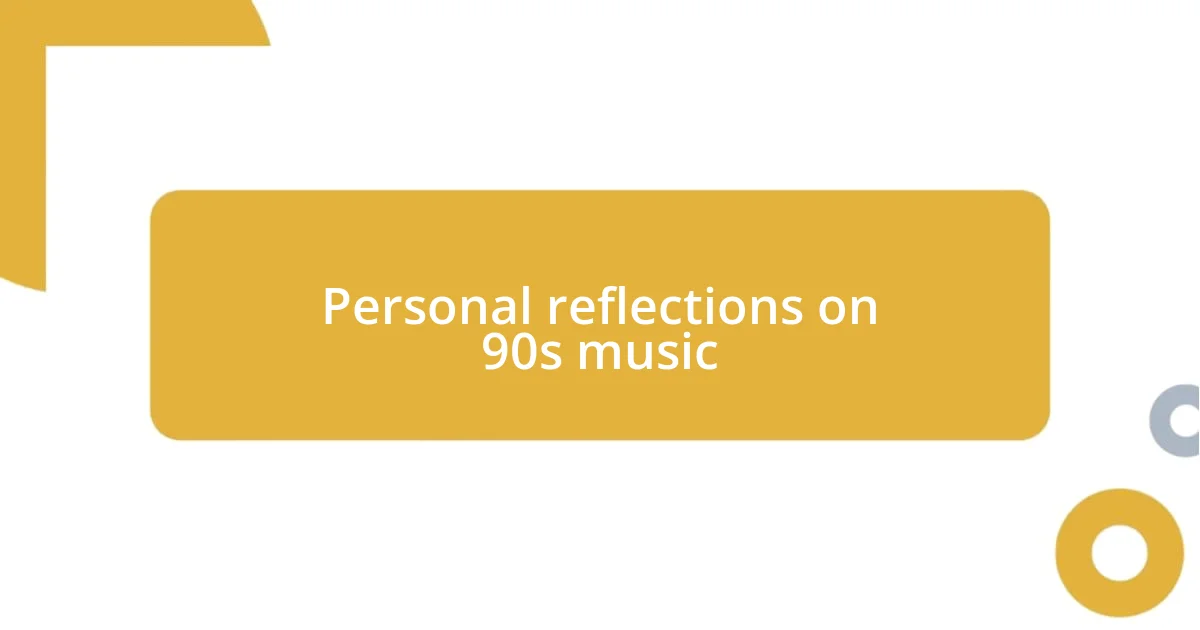
Personal reflections on 90s music
Reflecting on 90s music always takes me back to a time when mixtapes were a rite of passage. I remember jamming to grunge bands like Pearl Jam and thinking how their raw emotion spoke to me during my teenage angst. Those lyrics felt like personal confessions, almost as if the artists were channeling my feelings into their songs. I often wonder if today’s artists manage to evoke that same kind of connection.
Another aspect of 90s music that sticks with me is how it was an era of experimentation. I recall listening to the eclectic sounds of The Beastie Boys, who blended rap with rock in ways that felt groundbreaking. It made me excited about what music could become. I can’t help but ask: did this era spark a curiosity in you too? It certainly opened my mind to the potential of genre-crossing, making me appreciate the boldness of artists who dared to defy norms.
The sense of community around music in the 90s was palpable. I fondly remember my friends and I gathering to debate the latest albums, often discussing the cultural impact behind certain songs. It felt like we were part of something bigger. When I think of that camaraderie, I realize how those conversations shaped not just our tastes, but also how we viewed the world through the lens of music. Isn’t it fascinating how music can create connections that go beyond just the sound?
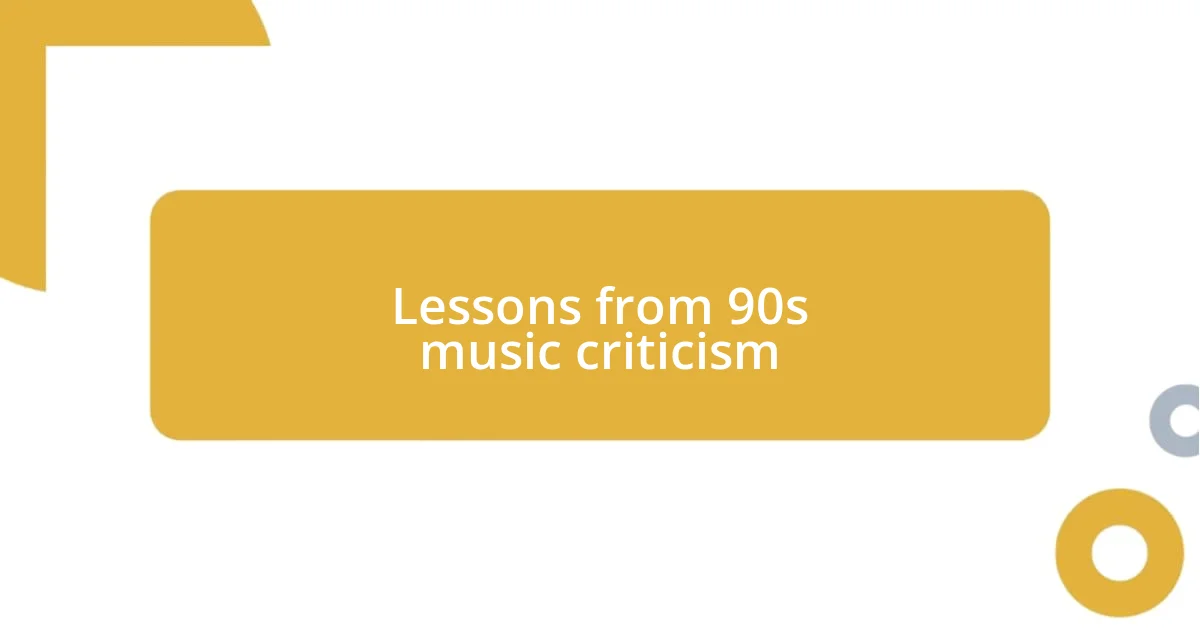
Lessons from 90s music criticism
One of the distinct lessons I took away from 90s music criticism is the value of questioning and dissecting music. I vividly recall flipping through magazine reviews, realizing that the critics weren’t just expressing opinions; they were urging listeners to dig deeper. This taught me that music isn’t an isolated enjoyment—it becomes richer when I engage with its layers, whether it’s the lyrics, the production, or the context. Have you ever noticed how a song changes when you learn its backstory?
Another crucial aspect was recognizing the diverse perspectives critics offered, which often sparked lively debates among friends. I remember intense discussions about artists like Alanis Morissette, where differing opinions unveiled the complexities of her work. It was like attending a masterclass in interpretation. Those moments made me appreciate that there’s no single way to understand music; instead, every viewpoint enriches the dialogue. Isn’t it fascinating how a simple song can motivate such varied interpretations?
Lastly, the critique during the 90s often highlighted the balance between commercial success and artistic integrity. I can’t help but think of how some artists, like Radiohead, were lauded for their innovation while being critiqued for not fitting into mainstream expectations. This discrepancy opened my eyes to the music industry’s intricate dynamics. I wondered: what sacrifices do artists make for their craft, and at what point does commercial appeal compromise their vision? This reflection has influenced how I listen to and evaluate new music, prompting me to celebrate those who stay true to their artistry amidst external pressures.
